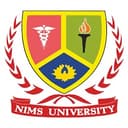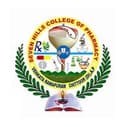Master of Pharmacy (MPharm)
OR
Prepared by Docthub Courses Team ∣
Last updated on 24 Oct 2024
Overview
A Master of Pharmacy degree is a post-graduate program that provides students with theoretical, practical, and technical knowledge of both traditional and modern medicine. It’s a valuable degree that makes graduates as knowledgeable as medical practitioners with years of experience. It opens up various opportunities in the healthcare industry such as drug research and development, sales, marketing, clinical trials research, drug regulations, quality control, and health policy development.
The course is two years long and covers advanced topics in the field of pharmacy, helping students to develop an interest in further research. It focuses on the process of developing new chemical compounds that can be used for medicinal purposes.

Table of Content
What is M. Pharma?
Professionals in the medical field are called pharmacists, chemists, or druggists, depending on their role in pharmacy. They all have the same goal, which is to help heal patients by advising on medicine use, dosage, and side effects, as well as dietary requirements. A pharmacy practitioner also determines which medicines require a prescription and which can be sold over the counter. An M. Pharmacy degree is required to work in a senior role in the pharmaceutical industry.
M. Pharm is an advanced course in life sciences that helps students understand how medicines are made and how they work in the human body to combat diseases. As a branch of medicine, M. Pharm degree holders can prescribe medication to patients like doctors. The pharmaceutical industry offers many job opportunities, and the course provides students with academic qualifications and analytical skills to work in practical fields. It is a highly respected field in today’s job market, and students pursue it for its vast career prospects. The M. Pharm course lasts for two years.
Highlights
| Course Name | Master of Pharmacy |
| Commonly known as | M. Pharm/ M. Pharmacy course |
| Course Level | Post-graduate |
| Course type | Degree program |
| Course duration | 2-year course |
| Minimum qualification | B. Pharm degree with min 45% marks |
M. Pharm Eligibility Criteria
To be eligible for a Master of Pharmacy course, students must have a Bachelor of Pharmacy degree with a minimum of 50% or equipment CGPA from a recognized university or college approved by the Pharmacy Council of India (PCI).
Some colleges may require a minimum of 60% or equivalent to be eligible for admission.
M. Pharm Course Duration
The M. Pharm course duration is usually two years, during which students develop advanced skills and knowledge in the field of pharmacy, such as drug research and development, clinical trial research, drug regulation, and health policy development.
M. Pharm Course Fees
The annual course fee for M. Pharm ranges from Rs. 30,000 to Rs. 1,75,000 depending on the college or university, location, and other factors such as infrastructure, faculty, and facilities provided to the students. Students can opt for scholarships or educational loans to cover their expenses.
Who should do M. Pharm?
M. Pharmacy is an appropriate course for those who have completed their Bachelor of Pharmacy and desire to enhance their knowledge and skills in the field of pharmacy. It is also suitable for individuals who want to pursue a career in the pharmaceutical industry, research, and development, clinical trials, drug regulation, quality control, or health policy development.
Why pursue M. Pharm?
Studying M. Pharm (Master of Pharmacy) is an excellent choice for students who want to pursue a career in the pharmaceutical industry.
- The program provides students with a deep understanding of pharmaceutical sciences, including drug discovery, development, manufacturing, and regulation.
- Graduates of the program can also pursue careers in academia and government agencies that regulate the pharmaceutical industry.
- The pharmaceutical industry is rapidly growing, and the demand for skilled professionals is increasing. Studying M. Pharm provides students with a competitive edge in the job market, as they acquire practical skills and knowledge that are in high demand.
- It also provides students with a sense of purpose, as they work towards creating medicines that improve health outcomes and save lives. It prepares students for a fulfilling career that contributes to society’s well-being.
M. Pharm Admission process
If you are looking to apply for admission to M. Pharm, here are the steps for admission:
- Check the eligibility criteria and registration dates for each college and entrance exam.
- Apply for the entrance exam and prepare according to the latest syllabus and pattern.
- Attend the entrance exam with the admit card and valid ID proof.
- After the exam results are declared, a counseling session will be held.
- Carefully fill in your college choices during the counseling session.
- The final selection of the candidate will be based on the counseling session.
- Accept the offer and pay the fees within the given time.
M. Pharm Entrance Exam
The M. Pharm entrance exam is a test that many universities and colleges in India use to select students for their Master of Pharmacy program. It is usually conducted online and consists of multiple-choice questions.
Some of the common M. Pharm entrance exams in India include:
| Entrance Exam | Full form | Conducted by |
| GUJCET | Gujarat Common Entrance Test | Gujarat Educational Board |
| GPAT | Graduate Pharmacy Aptitude Test | National Testing Agency (NTA) |
| NIPER JEE | National Institute of Pharmaceutical Education and Research Joint Entrance Exam | National Institute of Pharmaceutical Education and Research (NIPER) |
| AP PGECET | Andhra Pradesh Post Graduate Engineering Common Entrance Test | Sri Venkateswara University, Tirupati on behalf of the Andhra Pradesh State Council of Higher Education (APSCHE) |
| BITS HD Exam | Birla Institute of Technical Science Higher Degree Exam | Birla Institute of Technology and Science, Pilani |
| MET | Manipal Entrance Test | Manipal Academy of Higher Education (MAHE) |
M. Pharm Syllabus
The curriculum for M. Pharm may differ from one university to another, but the fundamental core and elective courses are quite similar. Here’s a general outline of the subjects taught in each semester from the first to the fourth semester in M. Pharm.
| Semester | Core/Elective subjects | Details |
| 1 | Modern Pharmaceutics | It introduces students to the various concepts of pharmaceutical industries, including active pharmaceutical ingredients and generic drug product development. Students also learn about industrial management and GMP considerations. |
| 1 | Regulatory Affair | This subject aims to provide information on the development of generic drugs, regulatory guidance, and guidelines for the filling and post-approval use of drug products for medicines. |
| 2 | Advanced Biopharmaceutics & Pharmacokinetics | This subject focuses on dose calculations, adjustments, and the application of biopharmaceutics theories in the practical world. Students also learn about the critical evaluation of biopharmaceutics and its design evaluation of dosage regimens. |
| 2 | Computer-Aided Drug Delivery System | This course imparts knowledge on the use of computer applications in pharmaceutical research and development. The computer helps model drug disposition, preclinical development, market analysis, and clinical development. |
| 2 | Molecular Pharmaceutics | This subject explains the area of the drug delivery system. Through this subject, the student will understand the various approaches for the development of novel drug delivery systems, criteria for the selection of drugs, and formulation of novel drug delivery systems. |
| 3 | Research Methodology & Biostatistics | The course covers biostatics, which is an essential part of clinical trials. It is also helpful for researchers to know about the result of the product. |
| 3 | Journal Club | This subject is intended to discuss a particular product. It is an educational meeting to discuss current research findings and make changes according to the discussion. |
| 4 | Discussion/ Final Presentation | In this subject, students present the final product or research. Under this subject, pupils first review and summarize their topic, then make appropriate suggestions. Based on their findings, students make a final presentation. |
Top M. Pharmacy Colleges
The M. Pharmacy course curriculum covers fundamental to advanced concepts required for a career in the pharmaceutical industry. India has numerous government and private colleges that provide quality education for B. pharmacy, some of which are listed below:
Top 10 Government M. Pharmacy Colleges:
| College Name | Fees |
| National Institute of Pharmaceutical Education and Research (NIPER), Mohali | Approx. Rs. 35,000 per semester |
| Jamia Hamdard University, New Delhi | Approx. Rs. 50,000 per year |
| Institute of Chemical Technology, Mumbai | Approx. Rs. 75,000 per year |
| Jadavpur University, Kolkata | Approx. Rs. 9000 per semester |
| Birla Institute of Technology and Science (BITS), Pilani | Approx. Rs. 3,50,000 per year |
| Delhi Institute of Pharmaceutical Sciences and Research (DIPSAR), New Delhi | Approx. Rs. 25,000 per year |
| University of Mumbai, Mumbai | Approx. Rs. 25,000 per year |
| Andhra University, Visakhapatnam | Approx. Rs. 20,000 per year |
| Guru Nanak Dev University, Amritsar | Approx. Rs. 23,000 per year |
| Rajiv Gandhi University of Health Sciences, Bangalore | Approx. Rs. 50,000 per year |
Top 10 Private M. Pharmacy Colleges:
| College Name | Fees |
| Manipal College of Pharmaceutical Sciences, Manipal | Approx. Rs. 3,60,000 per year |
| Narsee Monjee Institute of Management Studies (NMIMS) School of Pharmacy and Technology Management, Mumbai | Approx. Rs. 3,75,000 per year |
| JSS College of Pharmacy, Mysore | Approx. Rs. 1,90,000 per year |
| Poona College of Pharmacy | Approx. Rs. 1,50,000 per year |
| Bombay College of Pharmacy, Mumbai | Approx. Rs. 1,80,000 per year |
| Birla Institute of Technology (BIT) Mesra, Ranchi | Approx. Rs. 2,20,000 per year |
| Amrita School of Pharmacy, Kochi | Approx. Rs. 3,00,000 per year |
| PSG College of Pharmacy, Coimbatore | Approx. Rs. 1,50,000 per year |
| SRM College of Pharmacy, Chennai | Approx. Rs. 2,00,000 per year |
| Nirma University, Ahmedabad | Approx. Rs. 1,80,000 per year |
M. Pharmacy Scope
M. Pharmacy (Master of Pharmacy) is a field with a bright future scope, particularly in healthcare and pharmaceuticals. The pharmaceutical industry is expanding rapidly due to the increasing demand for quality healthcare and the emergence of new diseases. As a result, there is a high demand for skilled pharmacy professionals.
An M. Pharmacy degree provides advanced knowledge and skills in pharmaceutical sciences, drug discovery, clinical pharmacy, pharmacovigilance, regulatory affairs, and related fields, which makes graduates valuable assets to the industry.
M. Pharmacy graduates have various career opportunities such as drug development, clinical research, quality assurance, pharmacovigilance, regulatory affairs, academia, and more.
The healthcare industry is continuously evolving, and the demand for pharmacy professionals is expected to grow in the future. Pursuing an M. Pharmacy degree can be a promising career option with excellent prospects.
Career Opportunities after M. Pharm
Upon completing your M. Pharm, you will have various lucrative career options to consider within the pharmaceutical industry. These options include roles such as:
- Pharmacologists: This work includes creating and testing new medicines to see how they work in different situations. They follow the rules set by the Pharmacy Council to make sure the medicine is safe and effective. They also ensure that the medicine has the correct amount, side effects, and instructions for use.
- Quality Control: Quality control workers check and double-check the quality of medicines to ensure they meet the pharma council's standards. They also make sure that the medicines meet the company’s standards during and after production. They test the medicines and write reports about how accurate they are. They also keep records of the testing process used during inspections. This job involves overseeing and managing others.
- Pharmacognosy: Pharmacognosy is about using your knowledge of natural medicines to create therapeutic products. If you study this subject, you can work for companies like Dabur, Himalaya, and Zandu. You can start your career by working for a small herbal company and working your way up. It is related to other natural medicine branches such as Homeopathy, Unani, Yoga, Ayurveda, and Siddha.
- Oncology Pharmacist: The primary work is to provide medication care to patients with cancer. This includes creating and managing treatment plans, ensuring that the right medications are given to patients, keeping a watch for any negative reactions, and providing education and support to patients.
- Pharmacist: This involves giving prescription medications to patients, educating and counseling them about their medications, and ensuring that the treatment is safe and effective.
- Teaching: Obtaining a Ph.D. is recommended to become a teacher. Apply for associate professor positions in various institutes. Government college positions are a good option. With the industry’s growth, M. Pharm and Ph.D. graduates have ample opportunities to teach and train future students.
- Research Scientist: Pharmaceutical research and development involve drug discovery and drug design, requiring extensive knowledge and the ability to apply it effectively. The majority of this work takes place in research and development laboratories at both Indian and foreign companies. Pharmaceutical industry scientists are responsible for developing new drugs, therapeutic methods, and disease treatment procedures, with many opportunities available in major cities.
- Regulatory affairs: It involves putting together paperwork for exporting drugs to other countries. The amount of work can change based on the organization’s needs.
- Clinical Research: It is a crucial part of the pharmaceutical industry as new drugs and vaccines must go through trials before being released to the public. Clinical trials evaluate how the drugs work and their effects on people. Based on the outcome, drugs can be modified for further production and approval. In clinical research, there are various roles such as clinical programmer, who oversees lab activity, manages project deadlines, and assists with the planning and development of clinical trials. They also analyze and identify any errors in data to ensure accurate results.
M. Pharmacy Salary Prospect
In India, individuals with a Master of Pharmacy (M. Pharm) degree have good salary prospects. The salary can vary depending on various factors such as job sector, level of experience, and specific job roles.
The starting salary for M. Pharm graduates can range from 3-6 lakhs per annum, depending on the job sector and location. With experience and expertise, the salary can increase significantly.
For instance, pharmacists working in hospitals or community pharmacies can expect a starting salary of around 3-4 lakhs per annum, while those in the pharmaceutical industry can expect a starting salary of 3-5 lakhs per annum.
With experience, the salary can increase up to 6-10 lakhs per annum or more, depending on skills and expertise.
However, it is important to keep in mind that salaries can vary depending on various factors, and it is crucial to choose the right job sector and company to ensure a good salary package.
Explore colleges for this course

Explore this course by location..
by States
by Cities
Related Job Roles
Related Job Vacancies
View All 6 Jobs

FAQS
What is the scope of M. Pharm in pharmaceutics?
M. Pharm graduates can work in fields like drug formulation, quality control, research and development, and regulatory affairs. The scope of an M. Pharm in Pharmaceutics is wide and varied, offering many opportunities for career growth and development in the pharmaceutical industry.
What is the salary of an M. Pharm in pharmaceutics in India?
The salary of an M. Pharm in pharmaceutics in India can vary depending on several factors such as experience, job location, and the company. On an average, the salary of an M. Pharm in pharmaceutics in India is 3-5 lakhs per annum approximately.
Which M. Pharm specialization is best?
Each Specialization in M. Pharm has its benefits and career opportunities. However, Pharmaceutics, Pharmacology, Pharmaceutical Analysis, Pharmaceutical Chemistry, and Clinical Pharmacy are some of the most popular and in-demand M. Pharm specializations.
Does M. Pharm need NEET?
No, NEET is not mandatory for M. Pharm.
What is the M. Pharm course fees in India?
The M. Pharm course fees in India range from 30,000 INR to 1,75,000 INR.
How many M. Pharmacy colleges are in India?
The exact number of M. Pharm colleges in India is not readily available as it can vary year-to-year depending on the addition or removal of colleges. However, there are over 2000 Institutions in India that offer postgraduate pharmacy courses.
Related Course titles

Qualifications
BPharm (Bachelor Of Pharmacy)
12th Science PCB
Related Specialty
General Pharmacy
Clinical Pharmacy



